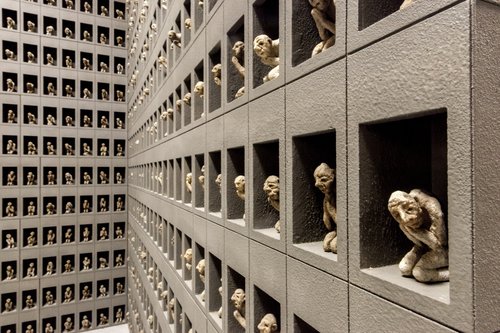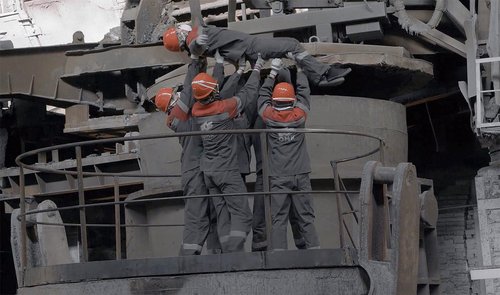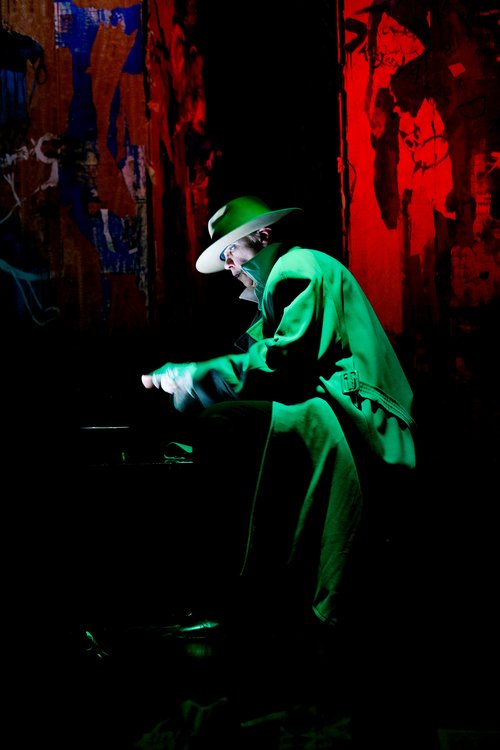Rijsttafel, Techno and Wonderland. Moscow, 2024. Courtesy of Simach
A new production by eccentric Moscow theatre director Habbilen Halychev is set in a high-end restaurant in the heart of the Russian capital. Along with gourmet dishes and unlimited prosecco, it offers insights into the world of post-truth that are not so easy to digest.
Habbilen Halychev’s over the top theatrical exploits are infamous – once his performers lip-synched operatic arias for three hours without a break – but is there any method in his madness? His most recent work is a gastro-performance called ‘Rijsttafel, Techno, and Wonderland’, which is performed in a restaurant in Moscow.
Based on a short story by American sci-fi writer Robert Sheckley, ‘Pas de Trois of the Chef, the Waiter and the Customer’, the play ‘Rijsttafel, Techno, and Wonderland’ was written specially for Renat Abdullin, Anatoly Gribkov and Halychev himself. It consists of three monologues with an afterthought, delivered by Alisa, a Russian-speaking AI-powered virtual assistant whose voice flows quietly from a speaker on the countertop of the bar in the restaurant.
The director Halychev has transported the action from sunny Ibiza to present-day Moscow, making some small yet meaningful changes to the plot. Each character still tells a different version of the same story but instead of what was originally a male customer fascinated by a young waiter there is now a woman - most likely to avoid any possible LGBT interpretations, now illegal in Russia. And the waiter-turned-DJ briefly mentions gigs in Europe he played “before the current situation”, a direct reference to the armed conflict in Ukraine, which quivers in the back of people’s minds as audience members savour their hors-d’oeuvres. Despite this reference to Ukraine, the performance does retain Sheckley’s typically wry humour and evokes a light-hearted atmosphere suitable to the venue, if not the time.
Performances are staged twice a month at Simach v Nedalnem, a glamorous restaurant and nightclub in Tverskoy Boulevard, a peaceful, leafy street in the centre of Moscow known for its theatres and restaurants. Lacking a stage, and with almost no space for the actors to move around, it is a challenging venue for a theatrical performance, yet this site-specific work is perfectly choreographed to fit the layout. The actors appear around the bar counter, roam between tables, or relax at a table waiting their cue. Surprisingly, despite the posh venue, it is not a show priced for oligarchs only: six thousand roubles, the equivalent of around 60 euros today is the cost of a decent dinner for one or a good seat at a theatre in Moscow. At ‘Rijsttafel, Techno, and Wonderland’ you get both for the price of one!
During the performance, waiters slide effortlessly between tables in the semi-darkness. Almost invisible, they change the dishes mid-monologue, while discreetly and endlessly refilling glasses with prosecco supplied by a sponsor, an Italian brand called Bruni. This silent performance of the waiters is almost as impressive as that of the actors. There has been the odd comic moment when one of the diners (or patrons) is mistakenly served an empty plate in the semi-darkness.
The actors rise to the challenge of performing up close to their audience - there can be no space for error when a wrong note or intonation could ruin the atmosphere. It is no mean feat, try holding the attention of an audience that is busy eating beef tartare with sea urchin eggs and sipping sparkling wine?
Is it that the dinner caters to the audience’s basic instincts, this crowd of hungry theatregoers who have come straight from the office, or is this an innovative experiment with synaesthesia, the attempt to engage all the senses at once? Perhaps both. Like a five-course dinner, this is a performance operating on many levels with subtle, even obscure cross-references. You might also miss the message of the AI that quotes from Chekhov, a character whose role remains rather unclear, other than presumably to please Yandex IT, another sponsor of the show.
Upon close inspection, ‘Rijsttafel, Techno, and Wonderland’ is a very traditional theatre piece, albeit played out in unconventional surroundings. The reason why it still looks and sounds contemporary is the ambiguity woven into the fabric of the laconic, yet complex story itself. Has the audience been drawn to the restaurant by the food, the music, or is it something else? Who among the characters is right and who is delusional about their secret power over other people’s choices?
Somehow these questions once raised by a classic piece of 1960s-70s science fiction feel oddly relevant now. Navigating many conflicting versions of the truth is something we have all become used to and so audiences today have ceased to notice the absurdity of the situation. Being unwittingly manipulated by those you do not notice is both one of the greatest fears and the most routine realities of today.
Towards the end of the play once the main course has been served, the monotone voice of the virtual assistant lulls the audience into a kind of dream-like nirvana. And as peaceful music starts to play the diners do not quite catch the precise moment when the (imaginary) curtain was meant to fall. The performance ends without an applause.

















